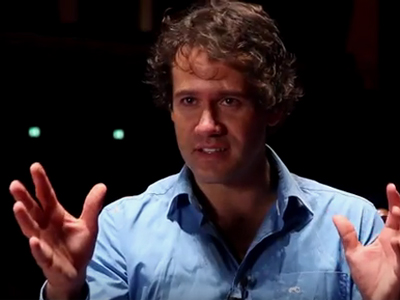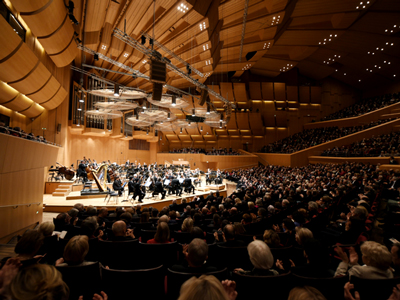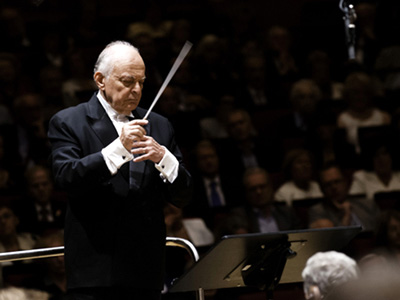
By ANDREW POWELL
Published: October 11, 2012
MUNICH — Arts groups here present a restrained 2012–13 season facing pros and cons not always aligned with those in America. Funding, for instance, holds steady: city and state (Bavaria) play their part, as do local corporations Siemens, BMW, Audi, Allianz and Linde. Excellent pools of musicians, instrumental and vocal, fill the rosters of the choir, chamber orchestra, two opera companies, and five symphony orchestras discussed below. Audiences are large and regular; not incidentally, tickets for most events are affordably priced and come with free access to the train and bus network, covering residents in a 25-mile radius. The cons are few, but they matter. Creative torpor impedes the main orchestras, a reflection in part of more than one sadly filled music directorship. The Regietheater problem rages in Germany, defiling the worthiest efforts in opera. Atrocious acoustics plague Munich’s main concert hall, and one vintage venue is shut for now for a retrofit. All that said, the groups enter the new season with active agendas.
The 201-year-old Bavarian State Orchestra ventures six programs at its home, the National Theater. Mostly led by outgoing Generalmusikdirektor Kent Nagano, these Akademie concerts extend a tradition begun when the ensemble was new; their past features names like Strauss, Walter, Knappertsbusch, Krauss, Fricsay, Sawallisch and Kleiber. Under-rehearsal can hamper results, however, a consequence of the musicians’ hectic theater schedule; that the GMD does not always supply the last ounce of insight or much rhythmic thrust only accentuates the negative. Despite and still, one upcoming program has allure (April 8 and 9): the eloquent young Czech conductor Tomáš Hanus tackles Mahler’s kaleidoscopic Seventh Symphony.
Clarinetist Jörg Widmann’s seven-scene opera Babylon is a fall commission of Bavarian State Opera, Germany’s largest and busiest opera company. Nagano conducts as part of his last season, and Carlus Padrissa, who last year introduced a circus-tent Turandot, has been entrusted with the stage action (premiere Oct. 27). Several of the season’s productions will be streamed at no charge, starting with the Widmann on Nov. 3. Hanus follows his persuasive (and filmed) Rusalka of two years ago with a revival of Jenůfa (from March 6) as well as a Richard Jones production of Hänsel und Gretel (March 24). Constantinos Carydis, among the company’s other worthy conductors — and indeed winner of its first Carlos Kleiber Prize — is absent from the 2012–13 slate, effecting a sabbatical.
The smaller but versatile Staatstheater am Gärtnerplatz company enters a second season as refugee while its genial home undergoes construction work. Not all the substitute venues are ideal, but at the Cuvilliés Theater a Don Pasquale (premiere Oct. 25) should bring smiles: Franz Hawlata sings the title role, retired mezzo-soprano Brigitte Fassbaender (pictured with Intendant Josef Köpplinger and conductor Marco Comin) serves as régisseuse. This company labors under a mixed mandate, complementing Bavarian State Opera with Baroque and rare operas but also catering to a broad audience with operettas and musicals, at times amplified. Its orchestra copes gamely with the assortment, its singers less well.
Alexander Liebreich’s ongoing leadership of the MKO, a.k.a. Münchener Kammerorchester, has been yielding tidy ensemble and a crisp image for the group. Subscription concerts at MKO’s base, the Bayreuth-Festspielhaus-like Prinz-Regenten-Theater, habitually pair old and brand new, as on Oct. 18: Salvatore Sciarrino’s L’ideale lucente e le pagine rubate (2012) and Beethoven’s music for Egmont. Or Dec. 13: Ligeti’s Violin Concerto (old) and a Helena Winkelman piece jointly commissioned with Musica femina München.
Guest conductors, in contrast, are what enliven the Bavarian Radio Symphony Orchestra. Ranked highly for its expertise, and drilled weekly for clean-as-a-whistle broadcasts, the BRSO perseveres under monochrome directorship. Antonini, Rattle, Haitink, Muti, Harding, Gilbert, Robertson, Salonen, Chailly and Metzmacher are names implying color in upcoming programs. The season splits as usual between the modest shoebox Herkulessaal, part of Munich’s Residenz arts complex, and the city-operated, fan-cum-vineyard Gasteig hall, where only the intra-ensemble sound travels properly.
The adventurous Münchner Rundfunk-Orchester, a second BR (Bavarian Broadcasting) ensemble, devotes much of 2012–13 to oddball concert opera — Franz Lachner’s Catharina Cornaro? — when its exploratory funds would go further in orchestral music and better balance the BRSO. Welcome projects include a German-language take (May 3) on Hindemith’s FDR oratorio When Lilacs Last In the Dooryard Bloom’d, which may find its way to disc alongside this orchestra’s award-winning 2005 recording of Des Simplicius Simplicissimus Jugend by Hartmann (who wove the Whitman elegy into his own First Symphony). Playing standards have been high under Künstlerischer Leiter Ulf Schirmer. He stepped into the shoes of the late Marcello Viotti in 2006 and has more recently also assumed musical and managerial duties at Oper Leipzig.
Still under broadcasting auspices, the BR Chor supports both of the above orchestras. Alert, flexible singing places this group among Germany’s best large choirs, with perhaps only Leipzig’s MDR Chor ahead in precision. Certainly it draws the better Munich choristers, those disinclined to strip down to their underwear and strike mindless poses, as repeatedly required of their colleagues in local opera companies. Dutchman Peter Dijkstra is the affable artistic leader. BR Chor concerts this season, in the group’s own series, include Mozart’s C-Minor Mass (Nov. 24) and a well-cast Matthäus-Passion (Feb. 16), at the Prinz-Regenten-Theater and Herkulessaal respectively.
The Munich Philharmonic seemed to want to dive off a cliff three years ago when its management publicly bickered with its greatly-in-demand Generalmusikdirektor Christian Thielemann, effectively losing him, and just eight months later chose Lorin Maazel as his successor. (One tabloid reported Thielemann’s salary to be €800,000.) Those twin decisions are now home to roost, as the 82-year-old American unfurls his inaugural season. Maazel’s work ethic can only be admired, but he appeared artistically drained in interregnum Gasteig programs ten months ago — in music in which he long ago excelled, such as Debussy’s La Mer. This orchestra will gain the most if Munich ever does build a proper concert hall, as recently championed by Bavarian Minister for Science, Research and Art, Wolfgang Heubisch. As a city-run ensemble, it is today confined almost entirely to the problematic Gasteig.
Less glamorous, though certainly busy, the Münchner Symphoniker offers concert series at the acoustically preferable Prinz-Regenten-Theater and Herkulessaal. Georg Schmöhe is Chefdirigent and pianist Philippe Entremont serves as Ehrendirigent. In 2011 this orchestra undertook a long U.S. tour devoted to movie music. This season at home it offers an all-Beethoven program (Jan. 27 and 28) and a mostly Haydn evening (March 20) as part of a generally conservative lineup.
Photo © Christian Zach
Related posts:
Pintscher Conducts New Music
Mastersingers’ Depression
Gärtnerplatztheater Reopens
Gergiev, Munich’s Mistake
BR Chor’s St Matthew Passion




Jansons! Petrenko! Gergiev!
Wednesday, January 23rd, 2013By ANDREW POWELL
Published: January 23, 2013
MUNICH — With the city council’s blessing today of Valery Gergiev’s hire as the next Chefdirigent of the Munich Philharmonic, all three of the Bavarian capital’s globally renowned orchestras will be in Soviet-born hands by late 2015. This September, 40-year-old Kirill Petrenko of Omsk, Siberia, finally takes over the theater-based Bavarian State Orchestra; his appointment was announced in 2010. Riga-born Mariss Jansons, 70, has been Chefdirigent of the Bavarian Radio Symphony Orchestra since 2003; his present contract is expected to be lengthened, reflecting a collegial tenure. (Munich’s three other professional orchestras, the Münchener Kammerorchester, the Münchner Rundfunk-Orchester and the Münchner Symphoniker, have German conductors.)
The when and who of Gergiev’s appointment, leaked last week by the Abendzeitung newspaper, are a surprise. It was only four months ago that Lorin Maazel began his leadership of the MPhil. Contrary to one London report, Maazel was never announced as “temporary” Chefdirigent. His main contract covers the period 2012–15, and he additionally helped during the sudden gap that followed predecessor Christian Thielemann’s deeply lamented exit. It is not clear whether the 82-year-old French-born Pittsburgher would have preferred to retain the position. Anyway, recent Munich concerts led by him have lacked spark.
Moscow-born Gergiev, 59, is another prominent name for Munich but hardly one associated with the Beethoven-Brahms-Bruckner repertory that has defined the MPhil in its finest seasons, under Ferdinand Löwe (1908–14), Rudolf Kempe (1967–76) and Thielemann (2004–11). He is not known for Mozart or Schubert and is no Mahlerian either. A 2010 Verdi Requiem at the MPhil’s acoustically appalling Gasteig home suffered from misshapen phrases and apparent under-rehearsal. Not even a 2011–12 Shostakovich cycle, divided between the MPhil and the Mariinsky Orchestra, brought consistently probing and satisfactory results. But Gergiev’s finger-wiggling, turn-the-page spontaneity can work wonders in coloristic music or in episodic works, or in passages laden with irony or humor. His Mussorgsky and Prokofiev are unsurpassed, his Rimsky-Korsakov and Tchaikovsky much admired. The conductor is surprisingly adept, too, in certain scores by Berlioz and Wagner.
Gergiev will relinquish his job as principal conductor of the London Symphony Orchestra, it seems, near the time his new duties start, which the Abendzeitung gives as 2015. The MPhil job has an undisclosed contract length; it paid a reported €800,000 annually during the last Thielemann years.
Photo © Landeshauptstadt München
Related posts:
Gergiev, Munich’s Mistake
Berlin’s Dark Horse
MPhil Vacuum: Maazel Out
Maazel: ’Twas Always Thus
Gergiev Undissuaded
Tags:Abendzeitung, Bavarian Radio Symphony Orchestra, Bavarian State Orchestra, Bayerisches Staatsorchester, Christian Thielemann, Commentary, Kirill Petrenko, London Symphony Orchestra, Lorin Maazel, Mariinsky Orchestra, Mariss Jansons, München, Münchner Philharmoniker, Munich, Munich Philharmonic, News, Symphonie-Orchester des Bayerischen Rundfunks, Valery Gergiev
Posted in Munich Times | Comments Closed